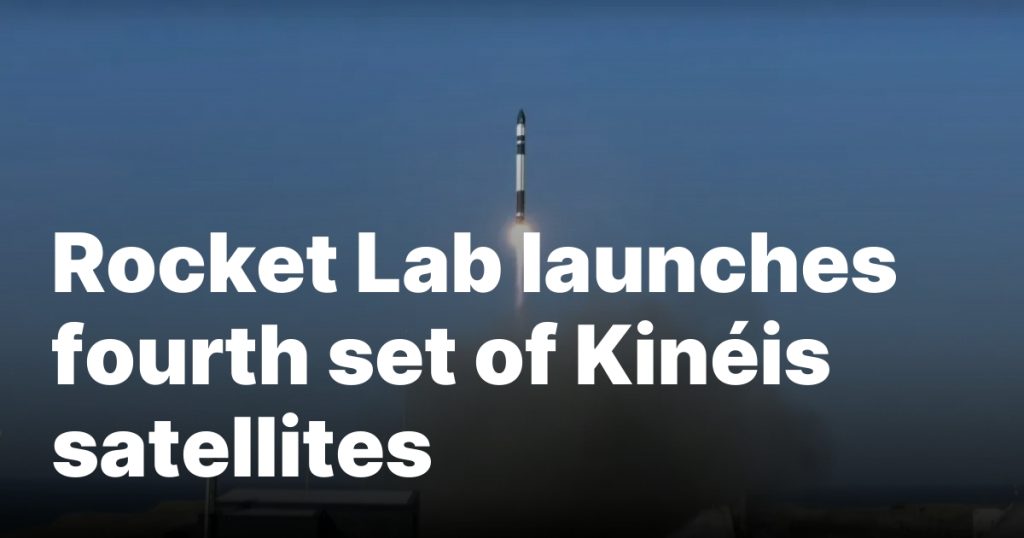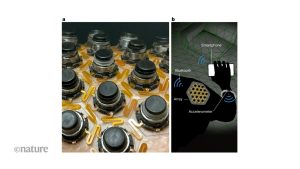WASHINGTON — Rocket Lab launched a fourth set of satellites for French company Kinéis Feb. 8 as it extends its lead in the small launch sector.
A Rocket Lab Electron lifted off from the company’s Launch Complex 1, Pad A, at 3:43 p.m. Eastern. The vehicle’s kick stage deployed its payload of five satellites a little more than an hour after liftoff in orbits with planned altitudes of 646 kilometers and inclinations of 97 degrees.
The launch was the four of five Rocket Lab is performing for Kinéis, a French company developing a constellation for Internet of Things services, after launches in June, September and November of 2024. The companies signed a contract for five Electron launches in 2021 to deploy the full Kinéis constellation.
Kinéis executives said last fall that they expected to have the full constellation in service in mid-2025. At the time the company said that initial services, including Internet of Things communications and Automatic Identification System (AIS) tracking, could start in early 2025 using the first 10 satellites, but it has not provided any updates since then.
The company announced Dec. 23 that its founding chief executive, Alexandre Tisserant, had stepped down, but did not disclose a reason for his departure. Christophe Vassal, chair of the company’s supervisory board, is leading Kinéis temporarily, with plans hire a new chief executive in the first quarter.
“I am proud to leave Kinéis after many exciting years filled with collective success and ambitious projects,” Tisserant said in a statement. “I am confident that the company is now solidly positioned to continue its growth and development.”
Beck: small launch is “solved”
The launch is the first this year for Rocket Lab, which conducted 16 Electron launches in 2024, including two of the HASTE suborbital variant of the rocket. The company has not disclosed a specific target for 2025 but stated it projects exceeding that mark.
That activity has made Rocket Lab the leading player in the small launch market as many of its competitors have struggled technically or financially. Peter Beck, founder and chief executive, took a victory lap in a keynote presentation at the Smallsat Symposium Feb. 4.
“Our view is that small launch is well and truly being solved,” he said in the talk, delivered by video. “Electron has been very successful there.”
He argued that Electron had found a niche for customers seeking dedicated launches of smallsats and willing to pay a premium compared to rideshare alternatives like SpaceX’s Transporter and Bandwagon missions. “Most people thought that would be the end of small launch,” he said of those rideshare options. “But, in fact, it wasn’t at all. Small launch has continued to grow and grow, and every year we sign more and more deals and do more and more launches.”
That includes a contract Rocket Lab announced Feb. 4 with Japanese company Institute for Q-shu Pioneers of Space, or iQPS, for four Electron launches of radar imaging satellites. Three of those launches are scheduled for 2025 and the fourth for 2026, each carrying a single iQPS satellite.
Beck, in the statement about the contract, stated that Electron is well-suited for deploying constellations as those systems require “spacecraft being deployed to precise orbits on tailored timelines to maximize the data collection or service provision” of the overall constellation. “This is the unique and reliable service that dedicated launch on Electron delivers.”
In his keynote, Beck said he was similarly unconcerned about emerging “super heavy” rockets like SpaceX’s Starship. “They’re great for particular purposes but they don’t solve every problem,” he said, noting that large passenger jets like the Airbus A380 have not wiped out the market for smaller aircraft.
“Super heavies are going to be amazing for interplanetary and a whole bunch of cool stuff,” he concluded, “but I don’t subscribe to the view that they destroy all launch.”







